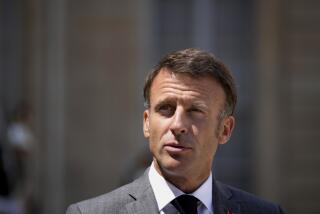Croatian Leader’s Reversal May Prevent New Fighting : Balkans: But diplomats doubt Tudjman’s decision to let U.N. peacekeepers stay will lead to lasting peace.
- Share via
ZAGREB, Croatia — President Franjo Tudjman’s decision to allow U.N. peacekeepers to remain in his country will probably prevent a new round of fighting in Croatia, Western diplomats and analysts said Monday.
But there is only faint hope that the move will lead to a lasting peace with this country’s rebellious Serbs, who have controlled one-third of Croatian territory in a yearlong cease-fire.
“All we have is a temporary respite,” said Col. Andrew Duncan of the London-based International Institute for Strategic Studies. “It puts off the evil day.”
Tudjman announced Sunday in Copenhagen that he had backed off an earlier decision to evict U.N. forces on March 31. His reversal came after intense lobbying, particularly by the United States and Germany, amid concerns that the withdrawal would reignite the war between the Croatian government and the breakaway Croatian Serbs.
The threatened expulsion was extremely popular in Croatia, where many Croats fear the presence of 12,000 U.N. troops has legitimized the gains of the Serbs.
Croatian Serbs took control of the territory, known as the Krajina, when the Serb-Croat war erupted in 1991, following Croatia’s declaration of independence from Yugoslavia.
“It is an issue of patriotism,” said one Zagreb resident, who declined to be identified. “We don’t want war, but we also don’t want to lose part of our country.”
But in the end, Tudjman decided his country had more to lose than gain by playing tough with the United Nations, the diplomats and analysts said.
Renewed fighting with the Krajina Serbs would have dashed hopes of economic cooperation with the European Union, which had linked participation in aid programs to a U.N. presence in Croatia. It would have also jeopardized millions of dollars in loans from international agencies, cut into already depressed tourism along the Adriatic Sea and removed much-needed U.N. spending from the Croatian economy.
In diplomatic terms, ejecting the United Nations would have also strained relations between Croatia and its most influential allies, the United States and Germany. It would have seriously tarnished the country’s image in the West.
“Tudjman is very concerned that Croatia be treated as a respected member of the family of nations,” one Western diplomat said. “He needs friends in high places right now, so he is not going to antagonize them.”
Croatian officials said Monday that Tudjman changed his mind on the U.N. presence after winning support from the United States and other allies for deploying U.N. troops along Croatia’s borders with Serbia and Bosnia-Herzegovina, which would effectively cut off the Krajina Serbs from their neighboring allies. U.N. troops are now stationed along the cease-fire line between Croatian forces and the Krajina Serbs.
“It was the most important issue for us,” a Croatian government official said. “And right now, it appears we will get it.”
But a previous U.N. resolution calling for U.N. peacekeepers along the Croatian-Bosnian border has been ignored, allowing the Krajina Serbs to cross unhindered into Bosnia and do battle there on the side of the Bosnian Serbs.
U.N. officials are expected to begin this week trying to persuade the Krajina Serbs and their allies in Belgrade to support a U.N. presence along the Croatian border, but the effort is already being described among some U.N. officials as a mission impossible.
“There is a fair amount of pessimism around here,” one U.N. official said.
Meantime, at the United Nations in New York, Ambassador Madeleine Albright circulated U.S. proposals for a new Security Council resolution to revamp the U.N. peacekeeping operation in Croatia.
A U.S. official said the new mission would be reduced to between 5,000 and 6,000 troops, perhaps 500 of which would guard 25 to 30 posts on borders separating Croatia from Bosnia and Serbia. He stressed they would not have enough force “to seal the borders militarily” but would serve as a deterrent to ensure that military equipment did not enter Croatia.
Tudjman has accepted these proposals but reportedly also set down conditions for the peacekeepers’ national makeup, saying he wanted no more Russians or Third World forces. When asked about this reported condition, the U.S. official said details would be worked out later.
More to Read
Sign up for Essential California
The most important California stories and recommendations in your inbox every morning.
You may occasionally receive promotional content from the Los Angeles Times.













